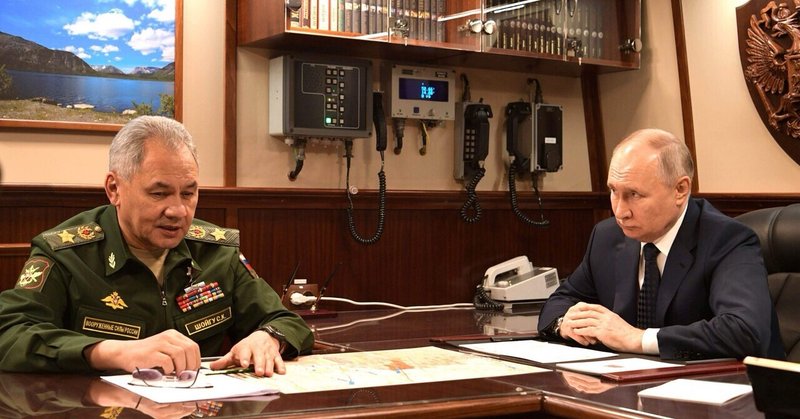
【抄訳】ISW ロシアによる攻勢戦役評価 2000 ET 28.12.2023 “NYT紙論説記事への意見表明:ロシアが関心をほのめかす和平交渉は幻想である”
本記事は、戦争研究所(ISW)の2023年12月28日付ウクライナ情勢評価報告の一部を抜粋引用したうえで、その箇所を日本語に翻訳したものである。
(*記事サムネイル画像:ロシア大統領府公式ウェブサイトより)
ニューヨーク・タイムズ紙論説記事への意見表明
報告書原文の引用(英文)
The New York Times (NYT) published an oped by a member of its editorial board calling for Ukraine to engage in negotiations with and cede territory to Russia after reports emerged that Russian President Vladimir Putin is using backchannels and intermediaries to signal his interest in a ceasefire. The oped largely ignores near-constant Kremlin public signaling of Russia’s continued maximalist goals in Ukraine. The oped argues that Ukraine should not “pass up” this opportunity to possibly achieve a ceasefire despite the fact that there are multiple reasons to believe that Putin’s pro-ceasefire signaling may not be sincere, such as Putin’s demonstrated untrustworthiness and the possibility that he may intend to use time spent on prolonged negotiations to his political and military benefit. The piece argues that Ukraine does not need to regain all its territory to emerge victorious from the war, but that a “strong, independent, prosperous, and secure” Western-oriented Ukraine is also a victory. The piece appeals to Ukrainian President Volodymyr Zelensky to engage in ceasefire negotiations and not see negotiations as a defeat, implicitly blaming Zelensky – not Putin – for the absence of serious negotiations.
The oped’s argument implicitly relies on the assumption that Putin’s reported backchannel communications more accurately reflect Putin’s thoughts and desires than his – and other Kremlin officials’ – constant public rhetoric. Kremlin rhetoric to both international and domestic audiences has repeatedly indicated that Russia is not interested in negotiating with Ukraine or the West in good faith and intends to achieve its maximalist objectives in Ukraine – which are completely incompatible with a strong, independent, or secure Ukraine that is a part of the West. Deputy Chairman of the Russian Security Council Dmitry Medvedev gave an interview to Russian state outlet RIA Novosti on December 28, for example, in which he responded to a question about the possibility of negotiations in 2024 by stating that the war will continue and that Russia’s goals in Ukraine remain the “disarmament of Ukrainian troops” (alternative wording for the long-standing Russian demand for Ukraine’s “demilitarization”) and " the rejection by the current Ukrainian state of the ideology of neo-Nazism (alternative wording for the Kremlin’s repeated demands for Ukraine’s “denazification”). Medvedev re-emphasized that the war would continue until Russia achieves regime change in Ukraine and also claimed that Odesa, Dnipropetrovsk, Kharkiv, Mykolaiv, and Kyiv (none of which Russia currently occupies) are “Russian cities” and complained that they are still marked as Ukrainian cities on maps. Medvedev’s comments reinforce copious other indications that Russia intends to annex or militarily occupy territory beyond the current line of contact and beyond the four (illegally) annexed oblasts and Crimea. Medvedev also claimed that Russia has always been open to negotiations with Ukraine and that negotiations can continue up until the “complete defeat and capitulation” of Ukraine – in line with ISW’s long-standing assessment that Russia does not intend to engage in serious negotiations with Ukraine in good faith and that Russia’s maximalist objectives, which are tantamount to Ukrainian and Western surrender, are unchanged. The Ukrainian government, on the other hand, has consistently been working on its 10-point peace plan, and Zelensky stated on December 19 that Ukraine is preparing to be able to present the peace formula to Russia in the future.
Russian Foreign Minister Sergei Lavrov made a number of statements on December 28 that also run contrary to the reported backchannel messaging on which the NYT oped and similar arguments rely. Lavrov claimed on December 28 in another interview with RIA Novosti that “hints and leaks” in the Western media show that the West wants to look for a way to end the war in Ukraine while still declaring a Ukrainian victory – possibly in response to Western reports about Russia’s willingness to negotiate. Lavrov also claimed that Ukrainian demands for the return of its 1991 borders amount to “demands for genocide.” Lavrov claimed that Ukrainians and Russians are “one people” and lamented the fall of the Soviet Union, after which millions of Russians were left outside of the borders of the Russian Federation--echoing many statements that Putin has made. Lavrov’s statements appear to invoke the Kremlin’s concept of “compatriots abroad” that is used to justify Russia’s definition of its “sovereignty” and right to defend ethnic Russians and Russian speakers beyond its borders. The Kremlin has recently returned to its “compatriots abroad” narrative to justify its war in Ukraine and when discussing Russia’s imperial reconquests in and beyond Ukraine.
The oped’s focus on the need for Ukraine to cede its land, finally, obscures the horrors that the Russian occupation is inflicting on the Ukrainian people living on that land. Russian forces and administrations have been engaging in large-scale and deliberate ethnic cleansing campaigns, forcibly and illegally deporting Ukrainians to Russia and replacing them with Russians and migrants to Russia. Russian administrations have illegally deported tens of thousands of Ukrainian children to Russia under various schemes, including causing Russian families to adopt them. Russian administrations are systematically working to eliminate the Ukrainian language, culture, history, and ethnicity in the areas that Russian forces occupy, as ISW has repeatedly documented. Many of these activities appear to violate the Convention on the Prevention and Punishment of the Crime of Genocide and deserve at least a mention in discussions about how Ukraine’s president should cede Ukraine’s land and people to Russia.
日本語訳
ニューヨーク・タイムズ紙(NYT)が編集委員メンバー執筆の論説を掲載したが、その論説記事はウクライナにロシアとの交渉への参加とロシアへの領土割譲を求める内容である。また、この記事は、ロシアのウラジーミル・プーチン大統領が裏ルートと仲介者を通して、停戦に興味があるというメッセージを伝えているという報道があらわれてきたのちに発表されたものだ。このNYT論説記事は、ウクライナにおけるロシアの最大規模の目標に変化がないことが、ほぼ継続的に公に発せられていることを、おおむね無視した内容である。プーチンが停戦を支持しているという情報発信が真摯なものではない可能性があると確信できるだけの理由が複数、存在するという事実があるにも関わらず、ウクライナは停戦達成の可能性の機会を「取り逃がす」べきではないと、この論説記事は主張している。プーチンの姿勢が真摯なものとは考えられないのは、プーチンには信用できない事例がすでにあるためであり、長期間の交渉をプーチンが自身の政治的・軍事的利益につなげるための時間稼ぎに使おうとする可能性があるからだ。この記事は、ウクライナがこの戦争から勝利を引き出すために全領土を奪還する必要はなく、「強力で、独立し繁栄して、安全が保障される」西側寄りのウクライナもまた勝利であると主張している。NYT論説記事は、ウクライナのウォロディミル・ゼレンシキー大統領に停戦交渉を行うよう呼びかけて、停戦交渉は敗北ではないとゼレンシキー大統領に訴えており、真剣な交渉が起こらないのは、プーチンのせいではなく、ゼレンシキーのせいであると、暗にゼレンシキーを非難している。
NYT論説記事が暗に依拠している仮定は、報道されたプーチンの裏ルート経由でのやり取りのほうが、プーチン自身と他のクレムリン当局者が公に発する、これと矛盾する内容の発言よりも、正確にプーチンの考えと希望を反映しているというものだ。国内外向けに発せられているクレムリンからの発言は、真摯な姿勢でのウクライナまたは西側との交渉にロシアが無関心であることを継続的に示しており、ロシアがウクライナにおける最大規模の目標の達成を目指していることも繰り返し示している。この最大規模の目標の内容は、強力で独立して、安全が保障され、西側の一部になるウクライナというものと、まったく合致していない。例えば、ロシア連邦安全保障会議副議長ドミトリー・メドヴェージェフはロシア国営メディアRAIノーヴォスチの12月28日付インタビューのなかで、2024年における停戦交渉の可能性に関する質問に答えている。そこでメドヴェージェフは、この戦争は今後も続くと述べたうえで、ウクライナにおけるロシアの目標は変わっておらず、一つは「ウクライナ軍部隊の非武装化」(ウクライナの「非軍事化」という以前から続くロシアの要求の言い換え)であり、もう一つはネオナチ・イデオロギー下の現ウクライナ国家の排除(クレムリンが繰り返し述べるウクライナの「非ナチ化」の言い換え)であると述べている。メドヴェージェフがあらためて強調したのは、ウクライナの体制変更をロシアが成し遂げるまで戦争は続くだろうということである。また、オデーサ、ドニプロペトルウシク、ハルキウ、キーウは「ロシアの都市」だとメドヴェージェフは主張している(なお、これらすべてをロシアは現在、占領していない)。メドヴェージェフはさらに、これらの都市が依然としてウクライナの都市として地図上に記載されていることに不満を洩らした。メドヴェージェフのコメントは、ロシアの意図に関するほかの様々な兆候を補強するものだ。ロシアの意図とは、現在の接触線[前線]を越えた範囲の領土を、そして、(不法)占領下の4州とクリミアを越えた範囲の領土を、軍事的に占領し併合することである。メドヴェージェフはまた、ロシアはウクライナとの交渉に対して常にオープンな姿勢であって、交渉はウクライナの「全面的な敗北と降伏」まで続いていくことがありうると主張した。この見解は、誠実な姿勢でウクライナとの真摯な交渉をする意図がロシアにはなく、ウクライナと西側の屈服にも等しい最大規模のロシアの戦争目的に変化がないというISWの以前からの評価と一致している。それとは反対に、ウクライナ政府は常に10項目の和平プランに取り組んでおり、ゼレンシキーは12月19日に、将来、ロシアに和平案を提示できるようウクライナは準備を進めていると述べている。
ロシアのセルゲイ・ラヴロフ外相は12月28日にいくつかの発言をしているが、その内容もNYT論説記事及びこれと同様の主張が依拠する裏ルートからのメッセージとされるものとは反対の内容だ。12月28日、RAIノーヴォスチの別のインタビューにおいてラヴロフは、西側メディアがいう「兆候やリーク」というものが示しているのは、西側がウクライナの勝利を依然として主張しつつも、ウクライナでの戦争終結への道を探りたいという姿勢だと主張した。このラヴロフ発言は、ロシアに交渉の意志があるという西側報道に、おそらく反応したものだろう。また、1991年国境に戻すというウクライナ側の要求は「ジェノサイドを求める要求」に等しいと、ラヴロフは主張している。ラヴロフの見解によると、ウクライナ人とロシア人は「一つの国民」であって、双方ともソヴィエト連邦の崩壊を残念に思ったとのことだ。そして、ソ連崩壊に伴い数百万人のロシア人がロシア連邦の国境の外側に残されてしまったと、ラヴロフは主張した。このような見方は、これまでプーチンが発してきた発言の多くを彷彿とさせるものだ。ラヴロフ発言は「国外の同胞」というクレムリンの考え方を喚起しているようにみえる。この考えは、ロシアによる自国「主権」の定義を正当化するために用いられており、自国国境外のロシア系の人々とロシア語話者を守護する権利を正当化するためにも用いられている。クレムリンは最近、ウクライナにおける戦争を正当化するために、この「国外の同胞」という言説を再び用いるようになっており、ウクライナ及びそのもっと先への帝国主義的再征服に関して議論する際にも再び用いるようになっている。
NYT論説記事の重点が、ウクライナの領土割譲の必要性に置かれていることは、結局のところ、ロシア占領体制がそこに住むウクライナの人々に与えている恐怖を曖昧にしてしまっている。ロシア軍及びその統治機関は、大規模かつ意図的な民族浄化キャンペーンに関与しており、不法かつ強制的にウクライナ人をロシアに移送し、その代わりにロシア人と外国からロシアに来た移住者を占領地に送り込んでいる。ロシア統治機関が様々な枠組を用いてロシアに連れ去ったウクライナ人の子どもの人数は数万人に及ぶ。ロシアが用いた枠組には、ロシア人家族がウクライナ人の子どもを養子にするというものも含まれている。ロシア軍占領下の地域において、ウクライナの言語、文化、歴史、民族性がロシア統治機関の働きによって、組織的に取り除かれ続けており、ISWはこのことを繰り返し記録し、その事実を立証してきた。このような行為のほとんどが、集団殺害罪の防止および処罰に関する条約[ジェノサイド条約]への違反であると思われ、ウクライナ大統領が自国領土と自国民を、どのようにロシアに譲り渡すべきかどうかを議論する際に、少なくとも一言は言及されるべきことである。
この記事が気に入ったらサポートをしてみませんか?
